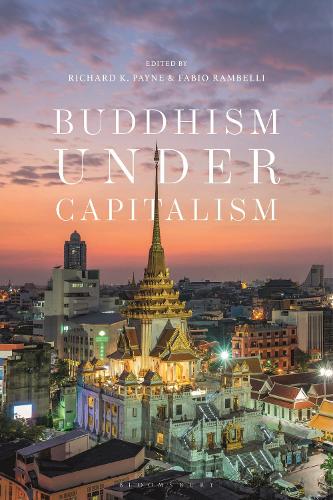
Buddhism under Capitalism
(Hardback)
Available Formats
Publishing Details
Buddhism under Capitalism
By (Author) Richard K. Payne
Edited by Professor Fabio Rambelli
Bloomsbury Publishing PLC
Bloomsbury Academic
29th December 2022
United Kingdom
Classifications
Tertiary Education
Non Fiction
Capitalism
294.3373
Physical Properties
Hardback
280
Width 156mm, Height 234mm
Description
This book argues that Buddhism has spread due to globalized capitalism, and explores how capitalism is also impacting Buddhists and Buddhism today. Edited by two leading scholars in Buddhist studies, the book examines how capitalism and neo-liberalism have shaped global perceptions of Buddhism, as well as specific local practices and attitudes. It examines the institutional practices that sustained the spread of Buddhism for two and a half millennia, and the adaptation of Buddhist institutions in contemporary, global economic systemsparticularly in Europe and the United States over the last century and half. These innovative essays on the interfaces between Buddhism and capitalism will prompt readers to rethink the connection between Buddhism and secular society. Case studies include digital capitalism, tourism, and monasticism, and are drawn from the USA, Tibet, China, Japan, and Thailand.
Reviews
By deftly revealing the complicated imbrications of various Buddhist traditions with different economic systems, this outstanding collection of essays not only fosters a radical re-interpretation of the Dharma's relation to capitalism, but it also provides valuable insights into today's necessary re-evaluation of the entangled relationship between religion(s) and the neoliberal order. * Johan Elverskog, Dedman Family Distinguished Professor of Religious Studies, Southern Methodist University, USA *
Richard K. Payne and Fabio Rambelli have produced an extraordinary edited volume that explores the influence of capitalism on Buddhist institutions as well as economic actors. This book is unique in how it draws connections between colonialism, neoliberalism, and global capitalism. This has profound implications for debunking stereotypes of Buddhism as world denying, but also for reflecting on the state of Buddhist studies today. * Michael J. Walsh, Professor and Chair of Religion, Vassar College, USA *
This volume debunks the common misconception that Buddhists and Buddhist institutions are unconcerned with the material world. In reality, as the contributorswho are the foremost experts on this topicshow, Buddhists debate and regulate exactly how to engage with the economy and material possessions, including money, property, loans, and investments. * Kin Cheung, Associate Professor of East and South Asian Religions, Moravian University, USA *
Author Bio
Richard K. Payne is the Yehan Numata Professor of Japanese Buddhist Studies at Institute of Buddhist Studies, Berkeley, USA, and a member of the Graduate Theological Unions Core Doctoral Faculty. He is author of Language in the Buddhist Tantra of Japan: Indic Roots of Mantra (Bloomsbury, 2018). Fabio Rambelli is Professor of Japanese Religions and ISF Endowed Chair in Shinto Studies at the University of California, Santa Barbara. He is co-editor of The Bloomsbury Handbook of Japanese Religions (Bloomsbury, 2021), Defining Shugendo (Bloomsbury, 2020) Spirits and Animism in Contemporary Japan (Bloomsbury, 2019), The Sea and the Sacred in Japan (Bloomsbury, 2018), and author of A Buddhist Theory of Semiotics (Bloomsbury, 2013).
